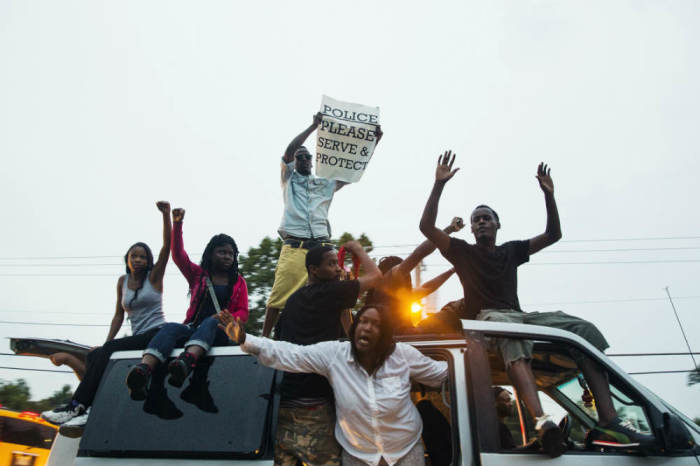Ferguson Riots: Twice As Many Blacks Believe Police Went Too Far As Whites Do

A poll released Monday found a huge gap between blacks and whites regarding whether the police response to unrest over the Aug. 9 shooting of an unarmed black teenager in Ferguson, Missouri went too far, again exposing the significant race relations divide still simmering in America.
The Pew Research poll revealed that 65 percent of blacks feel that the police response to the shooting "has gone too far", while the white response was approximately evenly split with 33 percent saying police went "too far" and 32 percent saying the response "has been about right". Thirty-five percent of whites felt they did not know whether police response had gone too far or not.
The poll also discovered that while 80 percent of African-Americans believe that the Michael Brown shooting "raises important issues about race", only 37 percent of Caucasians felt the same way.
Forty-seven percent of whites feel that "race is getting more attention than it deserves".
The poll conducted between Aug. 14-17 surveyed 1000 people with a margin of error of plus or minus 3.6 percent.
Robert Yamin, a retired white Baltimore City Police Officer who was involved in six use-of-force shootings during his law enforcement career, said that use-of-force incidents that end with a black male dead at the hands of a white cop will always cause racial unrest, whether it was justified or not.
"When you are talking about a racial incident when one person is white and one person is black, people are going to back their own person no matter what," Yamin said. "It doesn't matter if [the cop] is guilty or they are innocent."
Yamin says this unrest is caused when people that don't know anything about cases get involved from a political standpoint and want somebody to be held responsible for the death.
"Most of the people come out the walls. They know nothing about it but they want to involved. They want to see the officer indicted, convicted," Yamin said.
This need for social justice after incidents like the Brown shooting often times comes from bad interactions that African-Americans have had with the police in the past, Yamin added.
"Usually its because they have a past because somewhere they were either arrested or their brother was arrested or some family member," Yamin said.
Steve Chapman the writer of the Chicago Tribune column entitled "The Minority of One" wrote that whites, in general, can't relate to racism in policing because they haven't experienced the same interactions that African-Americans have.
"Whites can generally factor out race in their dealings with law enforcement. So they may have trouble understanding how being black changes one's perspective," Chapman wrote.
John McWhorter, a black professor at Columbia University and contributing editor at the New Republic, opined in a column for The Daily Beast that there is indeed a racial issue still UnrestUfacing America. However, the issue stems mostly from the young blacks common interactions with police officers, the stereotyping that surrounds those interactions and how police forces value the lives of blacks less than they do the lives of whites.
A few weeks ago a white 18-year-old named Steve Lohner carried a shotgun around in Aurora, Colorado, where in 2012 a gunman killed 12 people and injured 70 others. Lohner taunted law enforcement, in a quest to make a showy point about gun rights.
"Who among us can pretend that if a black kid was doing the same thing he wouldn't be much more likely to wind up killed?" McWhorter wrote. "As most will agree, cops need to get past the idea that what's cocky for a white kid is potentially lethal coming from a black kid."
African-Americans help fuel the negative stereotype surrounding them as nearly 50 percent of all homicides in the U.S. are committed by blacks. That is 14 times more than those committed by whites.
"Yet, I wonder if the black community could step it up some on this," McWhorter writes. "We need to devote some more energy to figuring out what we can do about the violence, because among all else that it destroys, it feeds a perception bias that ends up killing innocents like Michael Brown."
Another underlying issues regarding the relations between police forces and African-Americans are the War on Drugs. McWhorter wrote that if marijuana was legal it would help reduce the amount of policing in black neighborhoods and would lead to less gang violence.




























